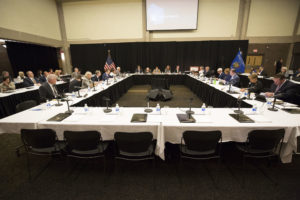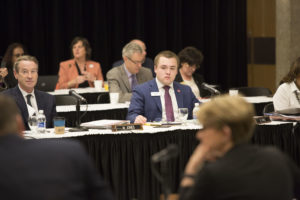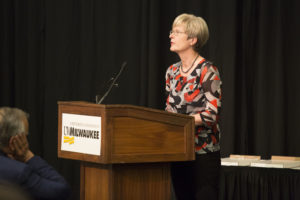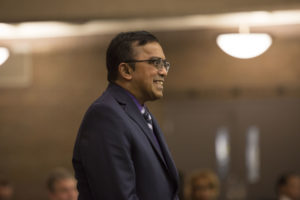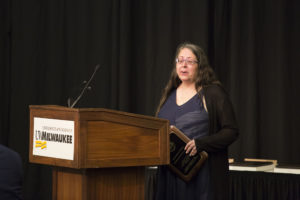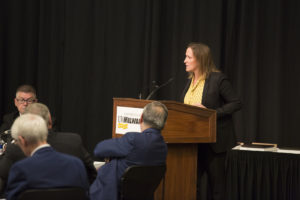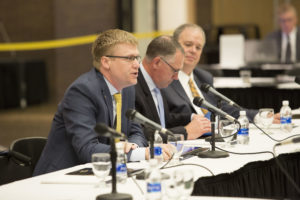MILWAUKEE, Wis. – With college affordability a top priority, the University of Wisconsin System Board of Regents approved a UW System proposal recommending increased state funding for financial aid at its meeting Friday at UW-Milwaukee.
The UW System is requesting an increase of $3.25 million in 2018-19 for the Wisconsin Grant-University of Wisconsin (UW) program, which is the state’s largest financial aid program for students attending UW institutions. This would return the average award to the 2009-10 level, providing a biennial increase of $6.50 million. The program is administered by the state’s Higher Educational Aids Board (HEAB).
“Affordability is a top priority, and this proposal reflects our commitment to UW System students, their families and a stronger future for Wisconsin,” said UW System President Ray Cross. “Higher education is so critical to the success of both individuals and our society. We need to keep the doors in the UW System open to any students seeking a college degree while helping limit their debt loads.”
- See the UW System news release
- See the
One in four resident UW System undergraduates – more than 30,000 students – received a Wisconsin Grant in 2016-17. The average grant was $2,022.
“There is legitimate concern about the rising levels of student debt. The amount of state and federal support a student receives plays a significant part in keeping the net cost of college down. It is incumbent on us to advocate for the support necessary for our students,” said Regent President John Robert Behling.
The Regent-approved financial aid request will now be forwarded to HEAB for inclusion in that agency’s biennial budget submission to the Department of Administration.
Annual budget approved
The Regents also voted unanimously to approve a $6.35 billion annual budget for 2018-19.
“The broader benefits that all of Wisconsin derives from having an educated workforce and citizenry are critically important,” President Cross said. “We want to ensure UW institutions continue to serve as a powerful economic engine for the state.”
“At first I was uneasy about increases in segregated fees and room and board,” said Student Regent Ryan Ring. He went on to note, however, that he recognized the segregated fee increases are largely attributed to student-initiated initiatives as well as a mandated pay plan, and room and board changes will ultimately benefit students. He supported the proposed budget.
“This budget is the best I’ve seen since I’ve been on the Board. It drives high quality affordable education and I’m proud to support it,” said Regent Bryan Steil.
- See the
Five key takeaways of the budget include:
- State funding increased by 5.6 percent ($59.7 million)
- Resident undergraduate tuition is frozen for sixth consecutive year
- Segregated fee increases are limited
- Program revenue balances are projected to further decline
- Average cost of attendance for resident freshmen increases by 1 percent
Other budget highlights:
- In accordance with the state’s biennial budget, the university’s annual operating budget includes a freeze on tuition for resident undergraduates at 2012-13 levels. Non-resident, international and graduate tuition increases approved by the Board in December 2016 will produce $34.7 million in anticipated new revenue.
- Total allocable and non-allocable segregated fees will see an average $33 increase (2.6%) at four-year institutions. Much of that increase is due to major projects previously approved by the Board of Regents and the State as well as student-supported projects.
- Room and board rates at the four-year institutions will increase by an average $118 (1.6%) with those increases primarily due to new and renovated residence halls, facility maintenance projects, and rising food costs.
- Gifts and Grant Funds are up nearly $100 million over last year – a strong
indication of the broad commitment and support for the UW System.
Regents present Teaching Excellence awards
The Regents honored the 26th annual winners of its Teaching Excellence Awards, recognizing outstanding achievements in teaching. They are the UW System’s highest recognition for members of its faculty and academic staff.
“These outstanding educators inspire students and fellow teachers alike with their innovative approaches to teaching and learning,” said Regent Janice Mueller, chair of the selection committee. “We are pleased to recognize their dedication to student success, demonstrating how learning can change lives.”
The 2018 recipients are:
- Martina Lindseth, Professor of German, Department of Languages, UW‑Eau Claire.
“Language is at the heart of the human experience,” Lindseth said. “The transformation (that comes with learning a foreign language) is striking. We become interculturally confident, with new perspectives on our own culture and passion and empathy for the cultures of others.”
- Kirthi Premadasa, Associate Professor, Mathematics Department, UW-Baraboo/Sauk County, UW Colleges.
“When you have a classroom of 20 students, how do you touch their lives? The best way is to give them confidence that they can do something big, realize their dreams, and become productive individuals,” Premadas said. “I do this by getting them to solve difficult problems. It gives them confidence to say ‘I
can do this.’ The moment they get that is the moment they are self-reliant learners.”
- History Department, UW-Green Bay.
“I hope people recognize that history as a program is vibrant, exciting, growing, getting students jobs and helping them learn the things they love to do,” said Heidi Sherman, chair of the UW-Green Bay History Department. “It is exciting to see the excitement of students in our program. We have students, now graduated, in Washington, D.C., and working with corporations in Wisconsin, teaching, and out in the community.”
Watch excerpts of remarks made by the award recipients:
- Video clip of Dr. Lindseth
- Video clip of Dr. Premadasa
- Video clip of Dr. Sherman, Chair of UW-Green Bay History Department
Presidents’ Reports
In his report to the Board, Regent President Behling emphasized the significant investment the State of Wisconsin makes in the UW System, noting that over the two years of the 2017-19 budget, the state will invest over $2.2 billion of taxpayer dollars, an increase of nearly $60 million.
He also reiterated that the state made an increased investment on the personnel side, providing for the largest salary increase for UW employees in a decade.
“It’s our job as a Board to ensure that funding is put to good use,” Behling said.
Behling also reported that while public dollars are up, Chancellors are working to increase their gift and grants funds. Those funds are up nearly $100 million over last year, he said, a strong indication of the broad commitment and support for the UW System.
President Cross updated Regents on recent interactions with colleagues nationwide, including a National Association of System Heads meeting and a National Summit on Dual-Mission Institutions in Higher Education. He also reported on recent meetings with shared governance groups in the UW System, saying his intent is to have thoughtful and deliberative discussions regarding the role and engagement of each unit at the System level.
In his report on News from Around the UW System, President Cross told Regents that the UW-La Crosse College of Business Administration, with more than 2,000 undergraduates and a highly qualified instructional staff of 68, has just received an international seal of approval from a global accrediting body.
- See the full News Around the UW System video for June.
President Cross also offer special recognition to Malcolm Brett, director of Wisconsin Public Media, as this year’s recipient of the Daniel K. Miller Station Leadership Award.
In his Faculty Spotlight feature, President Cross presented Dr. Karyn Frick, a neuroscience professor in the Psychology department at UW-Milwaukee, one of two R1 research institutions in Wisconsin, the highest rating for a research institution.
“What we are trying to do at UW-Milwaukee is figure out how hormones regulate memory,” said Dr. Frick. “If we can figure out the hormones that regulate memory foundation, they can be targeted for new drug development that can prevent and reverse Alzheimer’s. I thank you all for your support of students and funding this important research.”
Watch Dr. Karen Frick’s presentation about how hormones regulate memory
UW-Milwaukee’s NCAA Division I Athletics 2018 Annual Report
UW-Milwaukee Athletic Director Amanda Braun provided an overview of academic, fiscal and compliance matters in the UWM athletics program.
“We engage our campus and community in exciting ways,” Braun said. “We take pride in serving as ambassadors to UW-Milwaukee, making strong partnerships with the community. Our staff is focused on ensuring each aspect of our student athletes is supported – performance, safety, and embracing diversity and inclusion. These are critical elements as we prepare student athletes for life after campus.”
Given the elevated attention recently to Title IX-related issues, Braun noted that UWM provides Title IX training at the start of the year and regularly shares info at team meetings.
The program continues to work on improving graduation rates and other measures of academic progress.
UW-Eau Claire and Mayo Clinic propose partnership
President Behling introduced a new collaborative research agreement between Mayo Clinic Health Systems physicians and UW-Eau Claire.
“The intent of the partnership is to attract the best and brightest students to the region, offer them significant opportunities to connect with Mayo Clinic Health System researchers and providers, and fast-track them into medical programs and jobs that will help retain talent in Wisconsin and strengthen the quality of care in western Wisconsin,” Behling said.
UW-Eau Claire Chancellor Schmidt said he believes this partnership is the most important thing he will work on in his tenure at UW-Eau Claire.
Timothy Nelson, Director of Research and Innovation for Mayo Clinic, explained the potential of the collaboration: “With Mayo’s proximity to a world-class research institute in UW-Eau Claire, with new technology, new processes and access to students with a ‘why not’ attitude, we can be a medical hub beyond Wisconsin’s borders, while inspiring a new generation of student learners that gives hope to patients. We want to recruit the talent of students and faculty, promote science, and retain talent in Wisconsin.”
Nelson, who is a UW-Eau Claire graduate, said his own time at the university “sparked and ignited a passion to have healthcare innovation as the tip of my career and it defines what I do. That started with student and faculty relationships at Eau Claire.”
Regent leadership is re-elected
Board of Regent President John Behling and Vice President Drew Petersen were unanimously re-elected to their leadership positions for the 2018-2019 term.
In other business, the Board of Regents:
- Approved a resolution of appreciation for UW-Milwaukee for hosting the June 2018 Board of Regents meeting;
- Approved the UW-La Crosse Master of Science degree in Athletic Training;
- Approved UW-Milwaukee’s Bachelor of Science degree in Public Health;
- Approved the UW-Stevens Point Master of Business Administration degree in Applied Leadership and Decision Making;
- Approved the UW Flexible Option Bachelor of Science in Business Administration (BSBA) degree at UW-Parkside;
- Approved the proffer from the Trustees of the William F. Vilas Trust Estate;
- Approved revisions and removal of Regent Policy Documents;
- Approved two council members to the Natural Areas Preservation Council;
- Approved the design and construction of the gift-funded UW-Eau Claire Visitor Center and Admissions building;
- Approved initial renovations of UW-Milwaukee’s Northwest Quad, formerly a hospital, into business and instructional space;
- Approved the renovation and addition of lounge space to May Hall, a residence hall on the UW-River Falls campus;
- Approved a recommended name change, pending HLC approval of the UW Colleges and UW-Extension restructuring, for UW-Barron County to become UW-Eau Claire – Barron County;
- Approved a potential seven-year agreement with Pepsi Beverages Company for exclusive soft drink pouring and vending rights at the UW-Milwaukee;
- Approved a UW-Madison Service Agreement with AbbVie, Inc. to provide data analysis services in support of a clinical trial certain testosterone replacement therapies;
- Approved a UW-Madison Service Agreement with Novo Nordisk A/S for services in support of a clinical trial evaluating the effects of a drug treatment addressing loss of vision in patients suffering diabetic retinopathy; and
- Approved a pair of UW-Madison Service Agreements with Genentech, Inc. for services in support of a clinical trial evaluating effects of a drug treatment
- addressing loss of vision in patients suffering diabetic macular edema.
See more photos from the June 8 meeting
Photos by Troye Fox/UW-Milwaukee
The UW System Board of Regents will have its next meeting on August 23-24, 2018, in Madison

